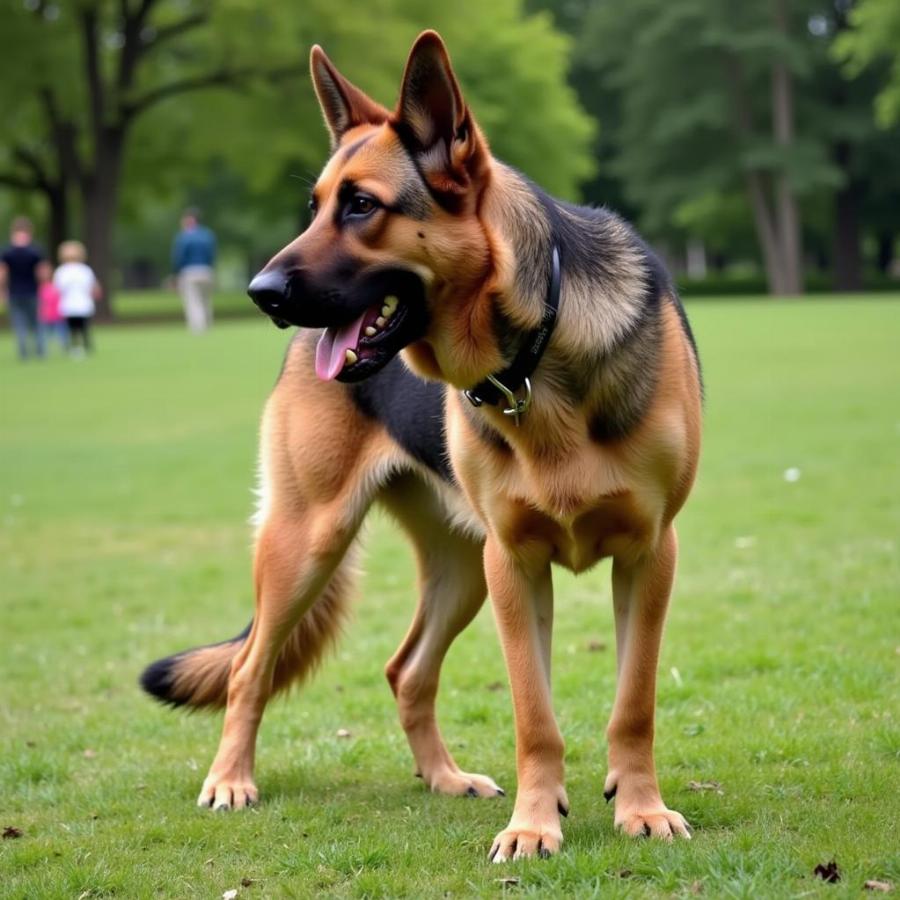Alsatian attack dog, a term often associated with German Shepherds, evokes images of powerful and intimidating canines. Understanding the nuances of this breed, their protective instincts, and the importance of responsible training is crucial for anyone considering an Alsatian as a companion. This article delves into the world of Alsatians, exploring their potential as protection dogs while emphasizing the significance of proper training and socialization.
Decoding the “Alsatian Attack Dog” Myth
The term “attack dog” can be misleading. While Alsatians possess natural protective instincts and are often employed in roles like police work and security, labeling them solely as “attack dogs” oversimplifies their complex nature. These intelligent and loyal dogs are capable of much more than aggression, thriving as family pets and companions when given the right environment and training.
It’s important to distinguish between inherent protective traits and trained aggression. An Alsatian’s protective instinct might manifest as barking at strangers or positioning themselves between their family and a perceived threat. However, true aggression, where a dog attacks unprovoked, is often the result of improper training or a negative environment.
 Chó Alsatian thể hiện bản năng bảo vệ
Chó Alsatian thể hiện bản năng bảo vệ
The Role of Training and Socialization
Training and socialization are paramount for any Alsatian, regardless of whether they are intended for protection work or companionship. Early socialization exposes them to a variety of people, places, and sounds, helping them develop into well-adjusted adults. Obedience training establishes clear communication between dog and owner, ensuring the dog understands and responds to commands.
For Alsatians specifically, training should focus on channeling their natural instincts in a positive direction. This involves teaching them to discern real threats from harmless situations and to respond appropriately. Professional training is highly recommended, especially for those seeking a protection dog.
Choosing a Responsible Breeder
Finding a reputable breeder is crucial for acquiring a healthy and well-tempered Alsatian. A responsible breeder prioritizes the health and temperament of their dogs, performing health screenings and carefully selecting breeding pairs. They will also be knowledgeable about the breed and willing to answer your questions about their dogs’ lineage and personalities. Avoid breeders who prioritize aggressive traits or promote their dogs solely as “attack dogs.”
Is an Alsatian Right for You?
Alsatians are intelligent, loyal, and active dogs who thrive on having a job to do. They require consistent training, exercise, and mental stimulation. Their protective nature can be a valuable asset, but it also requires responsible ownership. Consider your lifestyle, experience with dogs, and ability to provide the necessary training and attention before bringing an Alsatian into your home.
Beyond “Attack Dog”: The Versatile Alsatian
While the term “Alsatian attack dog” might be the search term that brought you here, it’s essential to understand the broader picture. Alsatians are versatile dogs capable of excelling in various roles, from family companions and therapy dogs to search and rescue and police work. Their intelligence, loyalty, and trainability make them exceptional partners for those willing to invest the time and effort required to nurture their remarkable qualities.
Conclusion
The term “Alsatian attack dog” often misrepresents the true nature of these intelligent and versatile canines. While their protective instincts can be valuable, responsible training and socialization are crucial for shaping them into well-adjusted companions. By understanding their needs and providing a positive environment, you can unlock the full potential of these remarkable dogs and discover the loyal and loving companion that lies beyond the “attack dog” stereotype.
FAQ
- Are Alsatians naturally aggressive? No, Alsatians are not inherently aggressive. They have protective instincts, but aggression is usually a result of poor training or environment.
- Do Alsatians need a lot of exercise? Yes, Alsatians are energetic dogs that require regular exercise and mental stimulation.
- Are Alsatians good with children? With proper socialization and training, Alsatians can be excellent family dogs and bond well with children.
- How much training does an Alsatian need? Alsatians benefit from consistent training throughout their lives, starting from puppyhood.
- Where can I find a reputable Alsatian breeder? Contact breed-specific rescue organizations or national kennel clubs for recommendations on reputable breeders.
- Is professional training necessary for an Alsatian? While not always mandatory, professional training is highly recommended, especially for first-time Alsatian owners or those seeking a protection dog.
- What are the signs of an aggressive Alsatian? Signs of aggression can include growling, snapping, lunging, and biting. Consult with a professional dog trainer or behaviorist if you observe aggressive behavior in your Alsatian.
Further Reading on Beaut Dogs:
- [Link to an article on German Shepherd Breed Information](This would link to a relevant article on your site if one exists.)
- [Link to an article on Dog Training Tips](This would link to a relevant article on your site if one exists.)
Beaut Dogs is your one-stop resource for all things dog-related, offering expert advice and valuable information on various breeds, care, and training. From breed-specific guides to essential tips on nutrition and health, Beaut Dogs empowers you to be the best pet parent you can be. When you need assistance, reach out to us at Email: [email protected] to get detailed and accurate answers from Beaut Dogs. Visit https://beautdogs.com today to explore the wonderful world of canine companions!